172 Search Results for karen
June 1, 2017
by Carole Zangari -
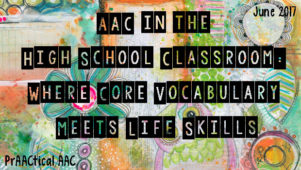
Today, guest blogger Sarah Mueller, a special education teacher in Rochester Michigan, shares her thoughts on supporting core vocabulary learning while working on functional life skills. Sarah teaches high school students with intellectual and developmental disabilities and strives to embed language and communication throughout her students’ entire school experience. Sarah helps her students become strong self-advocates as they prepare for adult life. Marlene Cummings, Sarah’s colleague and mentor, introduces the post. :::::::::::::::::::::::::::::::::::::::::::::::::::::::::::::::::::::::::::::::::::::: I (Marlene Cummings) had the pleasure of meeting Sarah 2 years ago as a new teacher in one of my districts. She immediately engaged in our county level professional learning opportunities in AAC and Literacy. The AAC focus presented strategies to support AAC and language learning including: core vocabulary, aided language input, vocabulary instruction and opportunities. The literacy focus was designed to create and implement a comprehensive literacy program taught by Drs. Karen Erickson and David Koppenhaver. The outcome:... [Read More...]
May 4, 2017
by Carole Zangari -
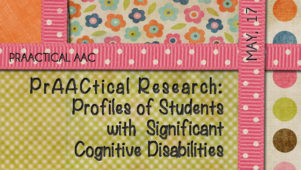
In today’s post, we welcome Dr. Kathy Howery who will be appearing here periodically to review some of the AAC research that is published in journals around the world. Kathy joins us from Alberta, Canada, and has worked in the field of assistive technology and special education for over three decades. Most recently she has completed her doctoral studies where she used phenomenological methods to seek understanding of the lived experience of speaking with/through a speech generating device. Kathy is currently working as consultant to schools and school districts across Alberta focusing primarily on children and youth with complex communication needs. In this first post, she helps us understand a study by Drs. Karen Erickson and Lori Geist published in the AAC journal last year. Enjoy! ::::::::::::::::::::::::::::::::::::::::::::::::::::::::::::::::::::::::::::::: Erickson, K. A. & Geist, L. A. (2016). The profiles of students with significant cognitive disabilities and complex communication needs. Augmentative and Alternative Communication,... [Read More...]
February 27, 2017
by Carole Zangari -
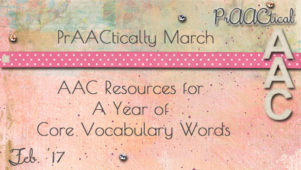
Do the AAC users in your life use only a fraction of the core words in their SGD, AAC app, or communication board? One way to help them move forward is to make a concerted effort to use, highlight, and provide additional teaching on a variety of words. It’s hard to do this without getting overwhelmed, so find a strategy that works for you. A few years ago, we decided to approach this by focusing on 12-16 core words each month. (If this is too much for the teams with whom you work, that’s not a problem. Just cut it back to 4-6 words/month.) Each month, we can highlight those words in our conversation (aided language input), direct intervention, and home programming activities with AAC learners. The repeated experiences with those 12-16 (or 4-6) words helps our AAC learners develop new skills, and keeps the team focused on the same destination. It’s... [Read More...]
January 16, 2017
by Carole Zangari -
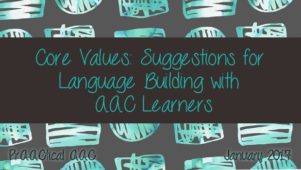
Here in the US, we celebrate the life of Dr. Martin Luther King Jr on the third Monday of January. It presents, among other things, a wonderful opportunity to talk and teach about concepts like tolerance, fairness, dignity, respect, and peaceful protest. Many of our AAC learners have a deeper understanding of these concepts than we will ever realize but they lack the language skills to discuss them in the same ways as their speaking peers do. Today, we share some ideas for continuing the conversation about these issues to help our AAC learners continue to develop their language skills. You may already have books, videos, and other resources that are useful in teaching about the life of Dr. King and the values he fought for, but here are some previous posts with a few more suggestions. Martin Luther King, Jr Holiday: 5 Resources for AAC Learners AAC and Anti-bullying... [Read More...]
November 2, 2016
by Carole Zangari -
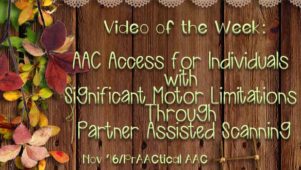
Developing effective communication systems for individuals with significant motor challenges is a challenging process. Ultimately, the goal is to provide them with tools and strategies that allow them to communicate independently and help them develop the skills needed to say what they wish to throughout their daily life experiences. As we all know, this can be a long journey. And while we work toward systems that allow them to communicate independently, they need access to language and communication now despite their motor limitations. Partner assisted scanning (PAS) is one option that works for many AAC learners. In this post, we feature a video overview of this strategy presented by SLP Maureen Nevers as part of the Communication Training Series by the Angelman Syndrome Foundation and the Foster Family Charitable Foundation, and a video of PAS in action by the Dynamic Learning Maps Professional Development (DLM PD) group under the direction... [Read More...]
October 12, 2016
by Carole Zangari -
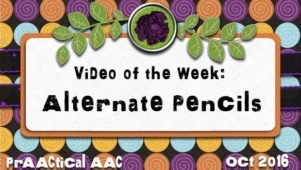
Despite their differences, one thing that many people who use AAC have in common is their need for additional supports to develop strong literacy skills. In today’s featured video, Dr. Karen Erickson, of the Center on Literacy and Disability Studies, introduces the concept of alternate pencils and discusses ways in which teachers, therapists, and families can begin using them to provide alphabet access to people with cognitive or physical disabilities. Let’s write! Direct Link to Video: https://www.youtube.com/watch?v=M1WgtZClfL8&feature=youtu.be
September 29, 2016
by Carole Zangari -
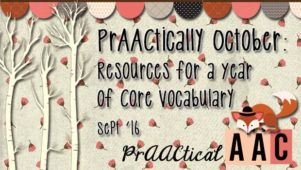
Know any AAC learners like these? Jeremiah has an SGD with thousands of core and fringe words, but he uses less than 100 of them in day-to-day life. Bella used an AAC app with visual scene displays to interact at playtime and during daily routines for the past several months. Her team just added an app with grid-based vocabulary so that she can begin to create novel sentences and expand her language abilities. Mason was recently evaluated for an AAC device, but it will likely take a few months to get the funding situation straightened out. In the meantime, his team created a manual communication board that mirrors the main screen of the SGD’s language software. Each of them need lots of practice to become fluent with the core words in their AAC systems. Are you looking for resources to support your use of core words in therapy, in the... [Read More...]
September 25, 2016
by Carole Zangari -
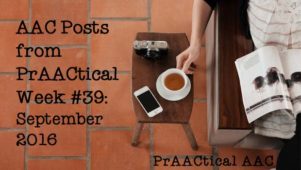
Meetings, therapy, assessments, paperwork, teaching, and more. It’s been a busy week for many of us. Here are some AAC posts you may have missed. Monday – Site of the Month: Project Core Tuesday – Teach Me Tuesday: Snap Scene and Pathways Thursday – PrAACtically Reading with Karen Natoci: Apples
July 3, 2016
by Carole Zangari -
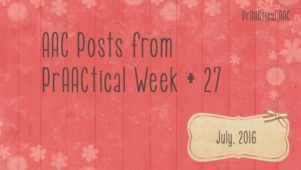
Busy week? Here are some AAC posts you may have missed. Monday – PrAACtically Reading with Karen Natoci: Hello Baby Wednesday – Video of the Week: Activity Schedule Action Thursday – PrAACtically July: Resources for a Year of Core Vocabulary
May 16, 2016
by Carole Zangari -
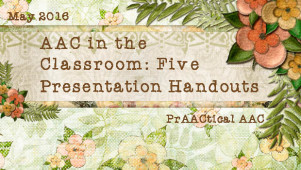
Looking for ideas on how to strengthen language learning by students with AAC needs in the classroom? Here are some presentation handouts that may spur your thinking. Start Talking in Class: Helping Students Using AAC Devices by Gail M. Van Tatenhove Incorporating AAC Use into the Classroom by Karen Vinson and Eleanor Thompson Aided Language Stimulation and the Descriptive Teaching Model by Gail M. Van Tatenhove Communication Peeled and Cored for the Classroom by Jennifer M. Ro and Amy Thomsen Score with Core: Implementing Core Vocabulary in the Classroom by Janet S. Lehr









